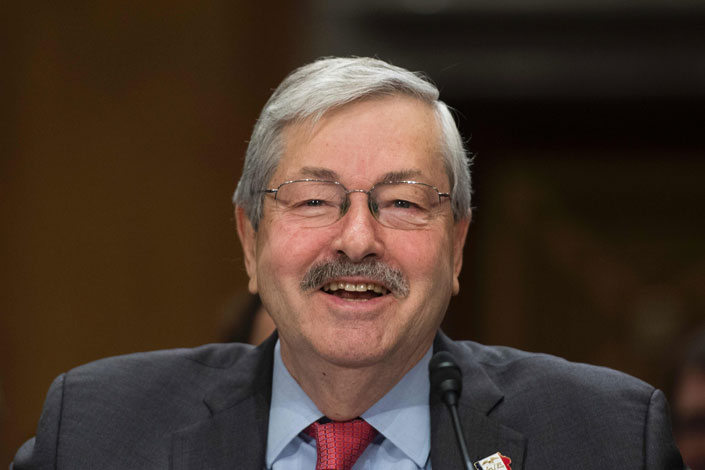American Businesses Welcome New U.S. Ambassador, Upbeat on Relations

(Beijing) – After getting a surprising boost from an upbeat first meeting between the U.S. and Chinese presidents, business ties between the world’s two leading economies could improve further still under Terry Branstad, the newly approved U.S. ambassador to China, business leader said.
The Senate on Monday voted overwhelmingly to approve Branstad as the new U.S. ambassador to China, six months after his name was first floated by then-incoming President Donald Trump. At that time, observers said Branstad’s extensive related experience could help to bridge what many worried might be big differences between a China-wary Trump and Chinese President Xi Jinping.
As the long-serving governor of the central U.S. state of Iowa, Branstad has a relationship with China dating back to 1985 when a Chinese delegation—including a then-31-year-old Xi Jinping — made a visit to study the state's agricultural practices. Since then, Branstad has been a strong supporter of trade in Iowa's agricultural goods with China, and describes Xi as an “old friend.”
“Terry Branstad is very familiar with China, and we’re sure he understands the kind of changes the economic relationship needs, as well as the immense benefits both sides can realize from a relationship based on fairness and reciprocal treatment,” said William Zarit, chairman of the Beijing-based American Chamber of Commerce in China. “We very much look forward to his arrival.”
The other major China-based American Chamber in Shanghai also welcomed the confirmation.
“His confirmation is a positive development for U.S.-China commercial ties, and it will help bolster the overall relationship,” said Ken Jarrett, president of AmCham Shanghai. “We look forward to working closely with the ambassador once he arrives in China.”
The mood was less upbeat when Branstad’s name was first floated late last year by Trump, who had accused China of stealing U.S. jobs and manipulating the nation’s currency to its advantage. But the pair of presidents struck a surprisingly cordial tone during their first meeting last month at Trump’s Mar-a-Lago estate in Florida. Xi ended that visit by extending an invitation for Trump to visit China later this year, which the U.S. leader accepted.
A month later, the two sides announced a new trade deal that would allow U.S. beef to be sold in China starting on July 16 and for cooked poultry from China to enter the U.S., following nearly 30 rounds of talks over the previous four weeks.
The rapid thaw in the relationship is cause for optimism that Branstad’s role could be even more productive by working off a more positive base, said Gary Dvorchak, Asia director at BlueShirt Group, a U.S.-based investor relations adviser.
“The reduction in the political tensions certainly helps the business environment,” said Dvorchak, an Iowa native whose family hosted Xi in Iowa during his 1985 trip. “There’s been a pretty good sigh of relief since Mar-a-Lago. There was a lot of tension going into that. On the margin the environment is a lot better. Branstad will be coming into a situation where he can be effective in terms of moving things forward instead of fighting fires and fixing issues.”
Contact reporter Yang Ge (geyang@caixin.com)

- 1Cover Story: China Carves Out a Narrow Path for Offshore Asset Tokenization
- 2Drownings Shake Chinese Enthusiasm for Travel to Russia
- 3China Business Uncovered Podcast: A $15 Billion Bitcoin Seizure and the Fall of a Cybercrime Kingpin
- 4Over Half of China’s Provinces Cut Revenue Targets
- 5Li Ka-Shing’s Port Empire Hit by Forced Takeover Amid Panama Legal Dispute
- 1Power To The People: Pintec Serves A Booming Consumer Class
- 2Largest hotel group in Europe accepts UnionPay
- 3UnionPay mobile QuickPass debuts in Hong Kong
- 4UnionPay International launches premium catering privilege U Dining Collection
- 5UnionPay International’s U Plan has covered over 1600 stores overseas





